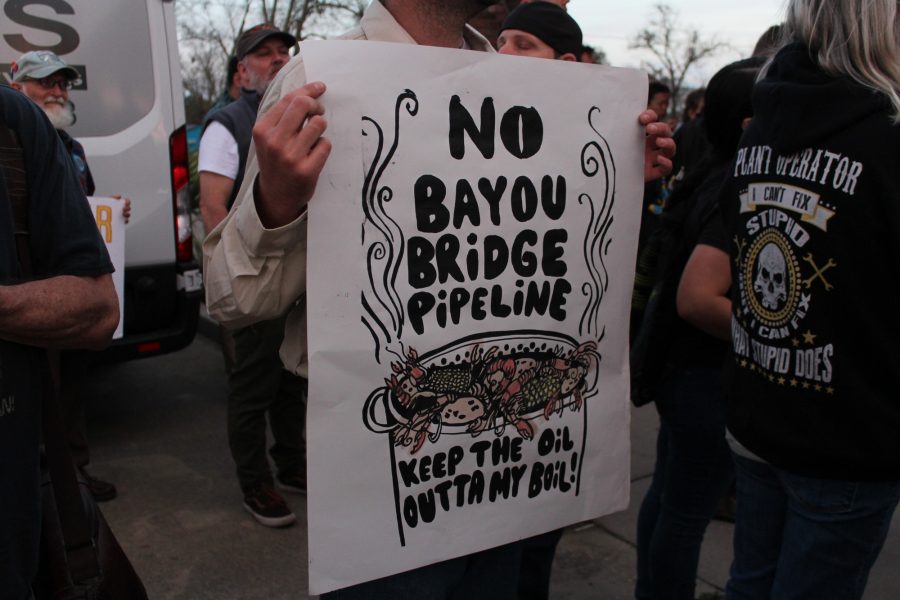Bayou Bridge hearing disrupted by protest
A protester holds up a sign prior to a hearing for the Bayou Bridge pipeline. Speakers at the hearing were often interrupted by protests from the crowd.
February 9, 2017
Some speakers had trouble making it more than a couple of seconds without heckling as protesters showed up in full force for the second public hearing for the Bayou Bridge pipeline in Napoleonville.
The hearing for the proposed 163-mile long pipeline, which operator Energy Transfer seeks to construct across much of the Atchafalaya Basin, followed an earlier hearing in Baton Rouge, which was filled with protest, and a notable booing of former Sen. Mary Landrieu.
The scene appeared to repeat itself Wednesday night, Feb. 8, except this time, tensions notched even higher.
After an initial presentation by Energy Transfer spokeman Kerry Farber, who called the pipeline: “exactly the pipeline President Trump envisioned,” former Sen. Landrieu, a Democrat, took the podium.
Landrieu opened by stating that she was at the previous meeting, and said: “I’m going to ask everyone to be as polite as possible to all the speakers.”
That request didn’t go over so well.
Landrieu said she supports the pipeline as a means of getting off of dependence for foreign oil, which she claimed comes from “tyrants, dictators and terrorists.”
That was one of the four points Landrieu hoped to make. She didn’t get past her second.
Much of her speech was interrupted by intense booing from the crowd, requiring hearing organizers to step in at times to urge the crowd to allow Landrieu to speak.
Her speech remained largely unintelligible, though, due to the disruptions.
Former Sen. Landrieu essentially booed off stage. #bayoubridge pic.twitter.com/Twmk7PjlYH
— Nick Reimann (@nicksreimann) February 9, 2017
Other speakers received the same treatment, with one, Joe Lopinto, speaking on behalf of the Jefferson Parish Sherriff’s Office, receiving it even worse.
“The federal government failed to provide local law enforcement with the resources they need to deal with violent and unruly protests,” Lopinto said, referring to the conflict over the Dakota Access pipeline in North Dakota. That project is also operated by Energy Transfer.
Lopinto also claimed the Dakota Access protests saw police officers as the target of shootings, among other claims of violence.
These claims heard the loudest jeers of the night from the crowd, with chants of “shame” and “how much” ringing out.
Despite the passions of those opposed, though, they don’t seem to have much support from elected officials.
Of the four Louisiana state legislators that spoke, none came out against the pipeline, nor did any of the legislators who spoke at the first pipeline hearing.
One legislator did seem to express concerns, though.
“Our wetlands are not for sale,” state representative Beryl Amedee said. “We need jobs, especially in my district, but that is not worth trading safety.”
Amedee’s entire speech seemed opposed to the pipeline, until her final statement, where she completely changed course, stating she was speaking in support of the pipeline.
In any case, the fate of the pipeline’s construction will soon be known.
By law, The Louisiana Department of Natural Resources now has 15 days to make a decision of whether to grant Energy Transfer a permit for pipeline construction.
Grant Dufrene contributed to this report.









Liz Scott Monaghan • Feb 9, 2017 at 9:01 pm
Where was the hearing held?
Angela Cubbedge • Feb 9, 2017 at 10:21 am
Very accurate and unbiased reporting. Thank you for the coverage and story. The meeting had to have lasted until midnight. Speaker number 49 took the podium at 10:30pm. There were over 100 speakers registered.